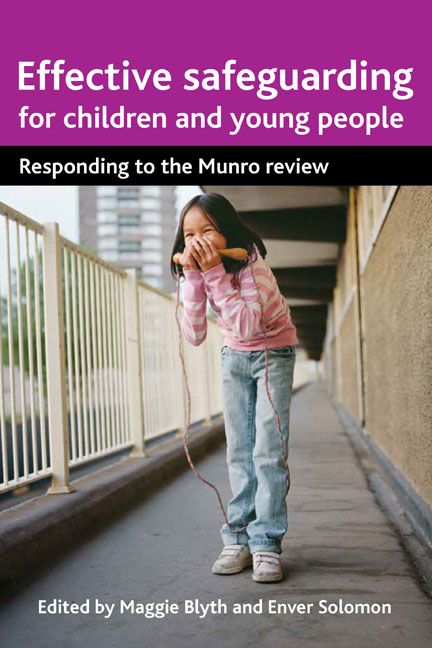Book contents
- Frontmatter
- Contents
- List of abbreviations
- Notes on contributors
- Acknowledgements
- Foreword
- one Early intervention
- two Local safeguarding children boards: faith, hope and evidence
- three The child's voice in the child protection system
- four Parental mental health, risk and child protection: what does Munro mean to child protection and adult mental health?
- five Adolescent-to-parent abuse and frontline service responses: does Munro matter?
- six Older children and the child protection system
- seven Serious case review
- Index
Foreword
Published online by Cambridge University Press: 07 September 2022
- Frontmatter
- Contents
- List of abbreviations
- Notes on contributors
- Acknowledgements
- Foreword
- one Early intervention
- two Local safeguarding children boards: faith, hope and evidence
- three The child's voice in the child protection system
- four Parental mental health, risk and child protection: what does Munro mean to child protection and adult mental health?
- five Adolescent-to-parent abuse and frontline service responses: does Munro matter?
- six Older children and the child protection system
- seven Serious case review
- Index
Summary
I am pleased to provide the foreword to this timely collection of different professionals’ views on the chances of successful implementation of the reforms proposed by Professor Eileen Munro.
I was heartened by the Professor's insistence that the child's concerns, timeframes, voice and views should be at the heart of work done to safeguard and protect them. Central to all our concerns must be the wellbeing and life chances of the children on whose circumstances our work focuses. We do them, and in the end ourselves, a disservice if we put our professional concerns and administrative, regulatory or bureaucratic demands before the paramount requirement that we meet children's needs, wishes and aspirations.
A striking theme in every chapter that follows is how easy we have found it, over years of developing ever more accountable ways of working, to place the child at the centre of our concerns, shaping our planning, service design and delivery, spending and regulation around that focal point. Even advantaged and well-supported children cannot level the playing field of opportunity for themselves. For the vast majority, those who smooth the way, ensuring they have rich opportunities to succeed, are their families, their schools and the people in their communities. The vulnerable children and families with whom targeted safeguarding and specialist child protection services work are much further away from enjoying those chances. We must step in and create these opportunities for and preferably with them.
We owe it to children to take Professor Munro's conclusions seriously. This means not simply reading, agreeing with and noting voices, views and reported lived experiences. It means taking up the challenges, affirming what we do that already delivers and, where necessary, changing what we do and how and with whom we work to make good what we are challenged to ensure.
We must remind ourselves that children, all of them vulnerable because they are children and some far more challenging because of what the adult world visits on their young lives, without exception, have the support they need and the right to be heard. Nothing less will do. They are the rights we promise to uphold and the promises we make to our children.
- Type
- Chapter
- Information
- Effective Safeguarding for Children and Young PeopleWhat Next after Munro?, pp. x - xiiPublisher: Bristol University PressPrint publication year: 2012



